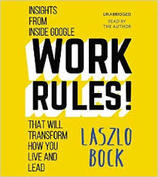|
It's been a while since I uploaded a new song, so I decided to spend a couple hours making one for everyone out there.
I was exercising a couple weeks ago, and Pandora randomly played 8 epic girly pop songs in a row. It basically turned it dancercize from then on. This inspired me to create a short medley edit of those songs: Kesha - Your Love is My Drug Avril Lavigne - What the Hell Taylor Swift - Blank Space Kesha - We R Who We R Lady Gaga - Telephone Cascada - Evacuate the Dance Floor Carly Rae Jepson - Call Me Maybe Kesha (ft. Pitbull) - Timber
0 Comments
 I had the pleasure of hearing Laszlo Bock talk at Google about his new book, Work Rules!: Insights from Inside Google That Will Transform How You Live and Lead. Following the talk, I read the book and was able to reflect on what I learned. Having seen him in person, I can say that his personality and passion for improving people's work lives really comes through in his writing. There's not much new that I learned given that I've experienced a lot of what Google People Ops takes care of firsthand. In fact, I was a bit shocked about how much detail the book went into and wondered if Laszlo got into any trouble with respect to confidentiality/trade secrets. I found it really interesting to hear about all the scientific studies and data/analytics that went into the design of the various perks and programs. It was also interesting to hear about how things evolved over time, and I really appreciated his devoting a chapter to the mistakes Google has made and lessons it learned from that. One of my biggest takeaways is how much managers and work environments matter. Engineers think those things don't make much of a difference, but Laszlo cites numerous primary and secondary studies that show this preconception is false. Below are my full notes. I highly recommend the book to anyone who wants to really get a deep glimpse about how HR and perks really work at Google. Preface High freedom work environment Manager serves the team. Remove roadblocks. Not about rewards and punishments. 1 Becoming a founder Founders both got Montessori education Hiring by committee Employees sharing what working on as tech talks Ownership sharing Free meals Encouraging women to code Giving freedom Mixing ppl on projects Let others act as founders and lead 2 culture beats strategy Mission, transparency, and voice Make all performance transparent 3 hiring most important people activity Better to hire the best than to hire medium and train Hire more slowly Only hire people who are better than u Managers don't pick own teams 4 searching for the best Internal referrals Internal search team finding good people at other companies Be specific in what seeking 5 don't trust your gut in interviews Avoid brain teasers and behavioral questions General cognitive ability Emergent leadership (informal) Googleyness Comfort with ambiguity Role related knowledge Conscientiousness Written feedback Set a high bar for quality Find your own candidates 6 let the inmates run the asylum Does ur manager trust u Take away power from managers Eliminate status symbols No power to hire or promote Make decisions based on data not manager opinion Run experiments to make decisions 7 why everyone hates performance management Focus on purpose not process OKR Numerical ratings in 5 levels Calibration across managers to remove bias Review list of common biases before each meeting Split reward convos from development convos Gather peer feedback 8 the two tails: opportunities are in best and worst employees Be a good coach Empower the team but don't micromanage Express concern for individuals well being Be very productive and results oriented Be a good communicator; listen and share info Help the team with career development Have a clear vision and strategy for the team Have important technical skills that help advise the team 9 building a learning institution Deliberate practice with feedback on small actions repeated over again Build repetition into training Best teachers are internal Compare identical groups who receive or don't training and see how they perform differently or not 10 pay unfairly Celebrate accomplishment not compensation Human performance has power law Experiential awards and gifts better than cash Peer bonuses Share bad news and bugs and learn from mistakes 11 best things in life are free Small perks Efficiency Community Innovation Make lives easier for employees 12 nudge a lot Send checklist emails Separate how stuff is vs ought to be 13 biggest people mistakes A crisis is an opportunity for impact 14 what u can do starting tomorrow Give ur work meaning Trust ur people Hire only ppl better than u Don't confuse development with managing performance Focus on the 2 tails Be frugal and generous Pay unfairly Nudge Manage rising expectations Enjoy and iterate Afterword: people operations Mass customization  I just finished reading The Art of Asking: How I Learned to Stop Worrying and Let People Help by Amanda Palmer. She's a musician, and I had never heard of her before and only learned about her book from Tim Ferriss's interview of her on his podcast. There was so much in the book that made me think of entrepreneurship, philosophy, building brands and communities, and life in general. Amanda has a TED talk that got over 6 million views and did a record-breaking Kickstarter raising over $1 million for a new album. In this book, she chronicles her many techniques and ideas for connecting with her fan base, building up that community over a long time, and how she has learned to ask for help throughout her life. I was shocked just how effective asking for help and engaging with strangers can be; it's truly inspiring. Below are my main takeaways. Foreword
Book
|
Archives
June 2024
Categories
All
Subscribe |
 RSS Feed
RSS Feed
